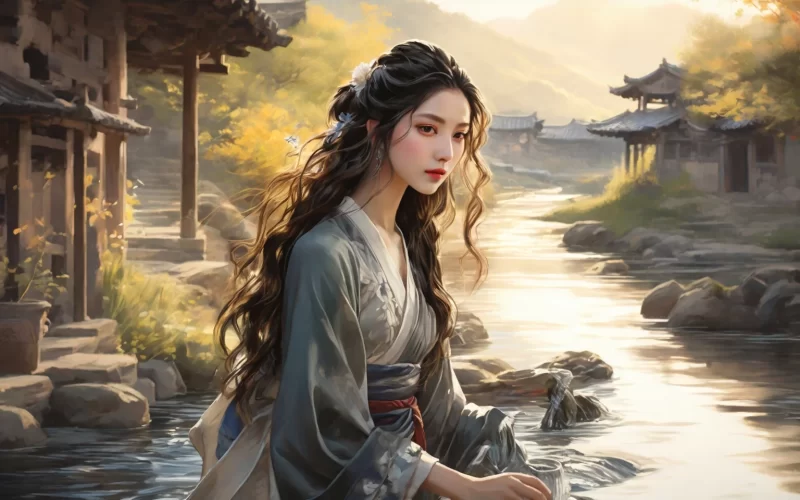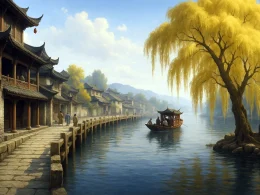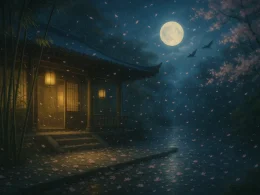Since beauty is honoured all over the Empire,
How could Xi Shi remain humbly at home? --
Washing clothes at dawn by a southern lake --
And that evening a great lady in a palace of the north:
Lowly one day, no different from the others,
The next day exalted, everyone praising her.
No more would her own hands powder her face
Or arrange on her shoulders a silken robe.
And the more the King loved her, the lovelier she looked,
Blinding him away from wisdom.
…Girls who had once washed silk beside her
Were kept at a distance from her chariot.
And none of the girls in her neighbours' houses
By pursing their brows could copy her beauty.
Original Poem
「西施咏」
王维
艳色天下重,西施宁久微。
朝为越溪女,暮作吴宫妃。
贱日岂殊众,贵来方悟稀。
邀人傅脂粉,不自著罗衣。
君宠益娇态,君怜无是非。
当时浣纱伴,莫得同车归。
持谢邻家子,效颦安可希。
Interpretation
This poem by Tang Dynasty poet Wang Wei (date of composition unknown) uses the legendary beauty Xi Shi as a vehicle to express profound reflections on the fickleness of human affairs and the unpredictability of fate. Through Xi Shi's story, the poet metaphorically addresses the plight of unrecognized talents in lower social strata, embodying a characteristic Tang literati style of conveying personal sentiments through historical allegory. Composed possibly during Wang Wei's own political disillusionment, the poem transforms Xi Shi's narrative into a mirror for the poet's suppressed frustrations.
First Couplet: "艳色天下重,西施宁久微。"
Yàn sè tiān xià zhòng, Xī Shī níng jiǔ wēi.
Beauty the world prizes above all -
Could Xi Shi long remain unknown?
The opening establishes Xi Shi's exceptional value while subtly implying the poet's own unappreciated talents. The rhetorical question carries the unspoken complaint of unrecognized worth.
Second Couplet: "朝为越溪女,暮作吴宫妃。"
Zhāo wéi Yuè xī nǚ, mù zuò Wú gōng fēi.
Dawn: a maiden by Yue's stream; Dusk: a queen in Wu's palace.
The stark dawn/dusk contrast underscores life's sudden reversals through perfectly balanced parallelism, each phrase mirroring the other's structure while opposing its circumstance.
Third Couplet: "贱日岂殊众,贵来方悟稀。"
Jiàn rì qǐ shū zhòng, guì lái fāng wù xī.
In obscurity - no different from others;
In favor - suddenly peerless.
This couplet exposes society's superficial valuations, where intrinsic worth only becomes visible through external markers of status.
Fourth Couplet: "邀人傅脂粉,不自著罗衣。"
Yāo rén fù zhī fěn, bù zì zhuó luó yī.
Attendants apply her makeup;
No need to dress her own robes.
The details of royal pampering reveal how privilege transforms even basic routines, illustrating patronage's transformative power.
Fifth Couplet: "君宠益娇态,君怜无是非。"
Jūn chǒng yì jiāo tài, jūn lián wú shì fēi.
Imperial favor breeds coquetry;
Royal love excuses all faults.
A biting commentary on how power distorts behavior and judgment, where favoritism overrides moral standards.
Sixth Couplet: "当时浣纱伴,莫得同车归。"
Dāng shí huàn shā bàn, mò dé tóng chē guī.
Her old laundry companions
Never share her carriage home.
The poignant separation from former peers highlights the isolating nature of sudden elevation.
Seventh Couplet: "持谢邻家子,效颦安可希。"
Chí xiè lín jiā zǐ, xiào pín ān kě xī.
Tell the neighbor's girl:
'Can frowns copied bring favor?'
The classic "furrowed-brow"典故 delivers the final disillusioned verdict on meritocracy's illusions.
Holistic Appreciation
Superficially a historical narrative, the poem actually constructs a multilayered critique. Wang Wei traces Xi Shi's trajectory from obscurity to privilege (couplets 1-4), then dissects the corrupting dynamics of patronage (5-6), culminating in a cautionary tale about authenticity (7). The tonal progression—from apparent celebration to piercing irony—reveals deeper strata of文人 (literati) resentment against capricious power structures.
Artistic Features
This poem exemplifies the classical technique of "expressing emotions through historical figures" and "conveying meaning through symbolic objects." The composition demonstrates rigorous structure with deceptively simple language that carries profound implications. The opening and closing lines form perfect bookends, while the natural transition between "morning maiden by Yue stream" and "evening queen in Wu palace" versus "her washing companions can't ride home together" creates a striking contrast that vividly portrays life's unpredictability and human fickleness. The典故 of "copying the frown" is employed with masterful relevance, exposing both the absurdity of blind imitation and the harshness of reality. Furthermore, through his depiction of Xi Shi's beauty and fate, the poet skillfully mirrors contemporary society, achieving that sublime artistic realm where profound meaning resides beneath seemingly plain words.
Insights
Through Xi Shi's sudden rise to favor, the poet reveals a fundamental truth: human worth is often determined not by inherent virtue or talent, but by external circumstances and others' patronage. Life's unpredictable turns frequently leave capable individuals trapped without avenues to realize their potential. It is precisely this understanding that leads the poet to channel his own emotions into this ode to beauty, expressing his quiet lament against fortune's injustice. The poem serves as a timeless reminder: we must discern the truth behind superficial glory, avoiding blind pursuit of empty fame; more importantly, we should cherish our own gifts and await with patience the moment meant for us.
Poem translator
Kiang Kanghu
About the poet

Wang Wei (王维), 701 - 761 A.D., was a native of Yuncheng, Shanxi Province. Wang Wei was a poet of landscape and idylls. His poems of landscape and idylls, with far-reaching images and mysterious meanings, were widely loved by readers in later generations, but Wang Wei never really became a man of landscape and idylls.












